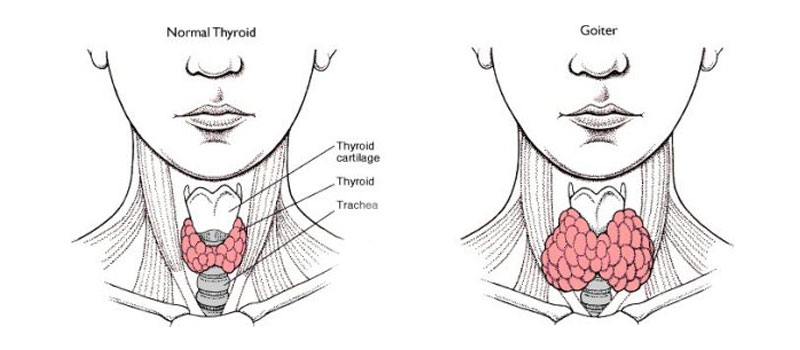What is a Goitre?
The term Goitre simply refers to the abnormal enlargement of the thyroid gland. The presence of a goiter does not necessarily mean that the thyroid gland is underactive or overactive – a goitre can also occur in a thyroid gland that is producing too much hormone (hyperthyroidism), too little hormone (hypothyroidism), or the correct amount of hormone (euthyroidism). A goitre indicates there is a condition present which is causing the thyroid to grow abnormally.
Goitre causes
One of the most common causes of goitre formation worldwide is iodine deficiency. While this was a very frequent cause of goitre in Australia and the United States many years ago, iodine deficiency is no longer commonly observed as a cause for goitre. The primary activity of the thyroid gland is to concentrate iodine from the blood to make thyroid hormone. The gland cannot make enough thyroid hormone if it does not have enough iodine. Therefore, with iodine deficiency the individual will become hypothyroid.
Consequently, the pituitary gland in the brain senses the thyroid hormone level is too low and sends a signal to the thyroid. This signal is called thyroid stimulating hormone – TSH. As the name implies, this hormone stimulates the thyroid to produce thyroid hormone and to grow in size. This abnormal growth in size produces what is termed a Goitre. Thus, iodine deficiency is one cause of goitre development. Wherever iodine deficiency is common, goitre will be common. It remains a common cause of goitres in other parts of the world.
Multinodular goitres are a common cause of goitres. Individuals with this disorder have one or more nodules within the gland which cause thyroid enlargement. This is often detected as a nodular feeling gland on physical exam. Patients can present with a single large nodule with smaller nodules in the gland, or may show as multiple nodules when first detected.
Multinodular Goitre symptoms and diagnosis
The diagnosis of a goitre is usually made at the time of a physical examination when an enlargement of the thyroid is found. However, the presence of a goitre indicates there is an abnormality of the thyroid gland. Therefore, it is important to determine the cause of the goitre.
As a first step, you will likely have a thyroid function test to determine if your thyroid is under active or overactive. Any subsequent tests performed will be dependent upon he results of the thyroid function tests. If the thyroid is diffusely enlarged and you are hyperthyroid, your doctor will likely proceed with tests to help diagnose Graves’ Disease.
If you are hypothyroid, you may have Hashimoto’s Thyroiditis and you may get additional blood tests to confirm this diagnosis. Other tests used to help diagnose the cause of the goitre may include thyroid imaging or thyroid biopsy.
Multinodular Goitre treatment
Many goitres, such as the multinodular goitre, are associated with normal levels of thyroid hormone in the blood. These goitres may not require any specific treatment after the appropriate diagnosis is made. If no specific treatment is suggested, you may be warned that you are at risk for becoming hypothyroid or hyperthyroid in the future and will need to be followed up by your doctor.
However, if there are problems associated with the size of the thyroid per se, such as the goitre getting so large that it constricts the airway, your doctor may suggest that the goitre be treated by surgical removal – which would require a total thyroidectomy in most cases.
Reasons to remove the thyroid in the presence of a multinodular goitre include:
- Toxic thyroid nodule (produces too much thyroid hormone)
- Compression symptoms – especially if there is compression of nearby structures, choking, or problems with eating and drinking
- Concerns about the possibility of cancer – especially if the thyroid biopsy results are unclear
Hashimoto’s Thyroiditis
Hashimoto’s thyroiditis is a more common cause of goitre formation in Australia and the USA. This is an autoimmune condition in which there is destruction of the thyroid gland by the body’s own immune system. As the thyroid gland becomes more damaged, it is less able to make adequate supplies of thyroid hormone. The pituitary gland senses a low thyroid hormone level and secretes more TSH to stimulate the thyroid. This stimulation causes the thyroid to grow, which may produce a goitre.
Graves Disease
Another common cause of goitre is Graves’ Disease. In this case, the immune system produces a protein, called thyroid stimulating immunoglobulin (TSI). As with TSH, TSI stimulates the thyroid gland to enlarge producing a goitre. However, TSI also stimulates the thyroid to make too much thyroid hormone (causes hyperthyroidism). Since the pituitary senses too much thyroid hormone, it stops secreting TSH.
In spite of this the thyroid gland continues to grow and make thyroid hormone. Therefore, Graves’ disease produces a goitre and hyperthyroidism.
If you have any questions about a multinodular goitre or thyroid symptoms, you should speak to your local doctor, who will arrange to contact your thyroid surgeon.

